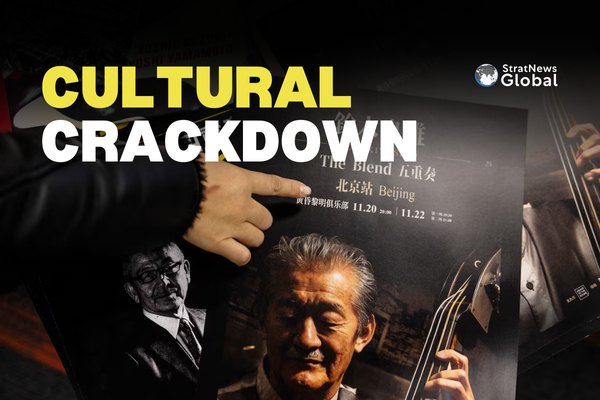Japanese jazz legend Yoshio Suzuki and his band were in the middle of a sound check for a long-awaited concert in Beijing on Thursday when plain-clothes police arrived and abruptly shut down the performance. The cancellation, according to organisers, was part of a wider order from authorities suspending all concerts featuring Japanese artists across China.
“After less than a minute, the venue owner came to me and said the police told him all concerts with Japanese people are cancelled and there is no discussion,” said Christian Petersen-Clausen, a Norwegian concert promoter based in China. Suzuki, an 80-year-old bassist, had spent months securing performance visas for his tour and was said to be “crushed” by the news.
The incident marks the latest escalation in a growing diplomatic rift between Beijing and Tokyo, triggered by recent comments from Japan’s new Prime Minister Sanae Takaichi. Takaichi said that a Chinese attack on Taiwan threatening Japan’s survival could prompt a military response, remarks that enraged Beijing.
Cultural Fallout and Broader Bans
Following the statement, China began imposing a series of retaliatory measures first economic, then cultural. It issued a travel boycott for Chinese tourists to Japan, banned Japanese seafood imports, and now appears to be extending its response to the entertainment sector.
Authorities have instructed Chinese venues to cancel all concerts featuring Japanese artists for the rest of 2025 and to stop submitting new applications for 2026 performances. Promoters are also barred from sending marketing messages about Japanese musicians.
Several planned shows have already been cancelled. In Beijing, fans of Japanese singer KOKIA were left waiting outside a venue on Wednesday evening after being told the concert would not proceed. Videos shared online showed disappointed fans chanting, “Give us our money back!” Meanwhile, rapper KID FRESINO’s China tour was postponed indefinitely, according to his local promoter.
Cultural Boycotts as a Political Tool
Analysts say China’s move reflects a familiar pattern. Beijing has a history of using cultural restrictions as leverage during diplomatic disputes. No major K-pop concerts have taken place in China since the 2016 THAAD missile defence dispute with South Korea, and Korean television dramas remain largely absent from Chinese streaming platforms.
Concert promoter Petersen-Clausen warned that the cancellations could further harm China’s struggling service sector, already weighed down by a weak economy. “Cancelling these shows will have a ripple effect fans cancelling flights and hotels, and reduced work for Chinese staff,” he said.
He added that live concerts are an important emotional outlet for young people coping with economic pressures. “We do see anti-Japanese sentiment sometimes online, but never at these concerts,” Petersen-Clausen said. “I’ve never, ever heard anybody bring politics into these moments.”
China’s foreign ministry has not commented on the cancellations.
(with inputs from Reuters)





